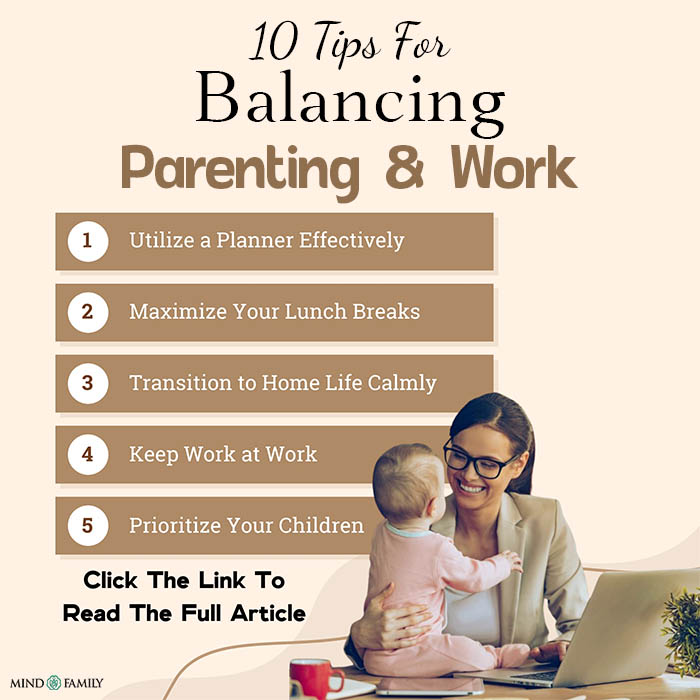In today’s fast-paced world, the delicate act of balancing parenting and work has become increasingly challenging for many.
As a working mother myself, I understand that parenting can come with a lot of pressure and can be stressful. Doing well at your job and taking care of your family needs careful planning. Striking this balance is tricky, especially when you have young kids.
But don’t worry – we at Mind Family have some helpful tips. These suggestions will guide you to a more peaceful and fulfilling life. From choosing a good preschool or daycare to spending quality time at home.
From doing fun family activities, involving kids in daily tasks, and managing time wisely – these tips are here to make life easier for working parents. So let’s make work-life balance for parents a bit easier!
Importance of Work-Life Balance For Parents
The importance of balancing parenting and work is very important for their happiness, health, and how well they do their jobs.
Here’s what some experts say:
1. Flexible Work Schedules for Parents:
Georgene Huang, CEO and Co-Founder of Fairygodboss highlights the importance of flexible work schedules for working parents.
She notes, “One of the biggest things employers are doing to accommodate working parents is the availability of flexible work schedules.” This flexibility can make parents “happier and more productive” by allowing them to manage unforeseen family-related events more effectively.
2. Supportive Workplace Culture:
Sheryl Sandberg, Chief Operating Officer of Facebook and founder of Leanin.org advocates for a change in workplace culture to support both men and women equally.
She suggests, “I would change our working culture to help women in the workplace. From a culture that teaches all of us that men should achieve and women should support others to the truth that everyone should achieve and everyone should support others.”
This emphasizes the need for a culture that values a healthy work-life balance and supports working moms and dads.
3. Professional Development and Equality:
The issue of equality and support for working mothers is critical. Research points out that a woman who is a mother is 78 percent less likely to get hired, and working mothers earn 15 percent less than childless women. This highlights the need for companies to offer equal opportunities and support to working mothers.
4. Incorporating Children into the Workplace:
Carla Moquin, Founder and President of the Parenting in the Workplace Institute, discusses the benefits of allowing children at work for both employees and businesses.
She explains, “The business can support employees at very little cost, and employees can have flexibility and more options to be parents as well as professionals.” This approach not only relieves parents but also integrates children into the workplace community, benefiting from seeing what their parents do.
These experts all agree that companies need to help them by balancing parenting and work by being flexible, supportive, fair, and even letting kids come into the workplace. This helps parents be happier and do their jobs better.
10 Effective Tips For Balancing Parenting And Work

Balancing parenting and work demands thoughtful strategies and a commitment to both family and career.
Here are 10 detailed tips to help working parents navigate this complex balancing act:
1. Utilize a Planner Effectively:
A well-organized calendar is crucial for managing your dual responsibilities. Mark down all significant dates, such as school events, medical appointments, and work deadlines, to stay ahead of your commitments.
This not only helps in keeping track of important dates but also in planning your work and personal life more efficiently. By having a clear overview of your schedule, you can avoid last-minute scrambles and ensure that you’re present for both your child’s milestones and your professional obligations.
2. Maximize Your Lunch Breaks:
Your lunch break is a valuable time that can be used for more than just eating. Consider using this time to handle personal tasks or to connect with your children, if feasible.
For example, you could make quick phone calls to check in on your child’s day or run errands that help streamline your after-work hours. This strategy allows you to integrate parenting responsibilities into your workday, making it easier by balancing parenting and work.
3. Transition to Home Life Calmly:
The mood you bring home can significantly affect the household atmosphere. It’s important to find ways to decompress after work so that you can be fully present and positive with your family.
Simple actions, such as listening to calming music during your commute or practicing a few minutes of mindfulness before entering your home, can make a big difference.
This helps in creating a peaceful environment where you can enjoy quality time with your loved ones without the stress of work looming over you.
4. Keep Work at Work:
In today’s always-on culture, it’s tempting to continue checking work emails or messages at home. However, setting boundaries by turning off work notifications during family time is crucial for balancing parenting and work.
This practice ensures that you can give your full attention to your family without distractions, fostering stronger connections and demonstrating to your children the importance of setting boundaries between work and personal life.
5. Prioritize Your Children:
No matter how demanding your job is, it’s vital to remember that your time with your children is precious. Make an effort to engage in daily routines, such as sharing meals or reading bedtime stories.
These moments are crucial for nurturing your relationship with your children and for providing them with the stability and attention they need. Prioritizing your children in this way shows them they are valued, even amidst a busy work schedule.
6. Simplify Household Tasks:
Look for ways to make daily life more manageable, such as hiring cleaning help, opting for grocery delivery, or preparing simple meals. Reducing the time spent on household chores allows you to dedicate more energy to quality moments with your family.
This approach acknowledges that time is finite and emphasizes the importance of spending it on what truly matters—being with your loved ones.
7. Prepare for Mornings Ahead:
Mornings can be particularly hectic for working parents. To alleviate stress, organize as much as you can the night before. Lay out clothes, pack lunches, and set out anything else you’ll need for the next day.
This foresight can transform your morning routine from chaotic to calm, setting a positive tone for both you and your children as you start the day.
8. Designate Family Days:
Establish specific days or evenings as family time, ensuring that everyone is present. This could mean having a game night, going for a hike, or simply watching a movie together.
Consistently dedicating time to family activities reinforces the value of family bonds and creates lasting memories. It’s a reminder that, despite the inevitable busyness of life, family always comes first.
9. Collaborate With Your Partner:
Sharing parenting and household responsibilities with your partner can significantly lighten your load. Open communication and teamwork are key to finding a balance that works for both of you.
By dividing tasks according to each other’s strengths and schedules, you can ensure that neither partner is overwhelmed and that family time is maximized. This collaborative approach fosters a supportive and understanding family dynamic.
10. Let Go of Guilt:
Feeling guilty for juggling work and family is common, but it’s important to acknowledge the benefits your career brings to your family, such as financial stability and personal fulfillment.
Focus on the quality of the time you spend with your family, rather than the quantity. By being fully present and engaged during family moments, you can create meaningful experiences and strong bonds. Remember, it’s the love and attention you give that truly matter to your children.
By implementing these strategies, working parents can find a more harmonious balance between their professional responsibilities and their invaluable role within the family.
A Word From Mind Family
Balancing parenting and work is a challenging yet rewarding journey for parents. At Mind Family, we understand the struggles and complexities that come with balancing these two crucial aspects of life. We’ve explored expert advice and provided ten actionable tips to empower working parents in their quest for equilibrium.
Remember, the importance of work-life balance for parents cannot be overstated. It impacts not only your happiness and well-being but also the quality of your relationships and your performance in both roles.
Flexibility in work schedules, supportive workplace cultures, and equal opportunities for all parents are essential factors in achieving this balance.
Together, let’s make the pursuit of work-life balance for parents a reality.
Frequently Asked Questions (FAQs)
1. Why is work-life balance for parents important?
Work-life balance for parents is crucial for their happiness, health, and job performance. It ensures they can excel in both professional roles and family responsibilities, leading to a more fulfilling life overall.
2. What are some tips for balancing parenting and work?
Tips include utilizing a planner, maximizing lunch breaks, transitioning to home calmly, prioritizing children, simplifying household tasks, preparing for mornings, designating family days, collaborating with partners, and letting go of guilt.
3. What is meant by work-life balance for parents?
Work-life balance for parents means effectively managing the demands of both work and family life. It involves allocating time and energy to professional responsibilities while also nurturing relationships and fulfilling parental duties outside of work hours.












Leave a Reply